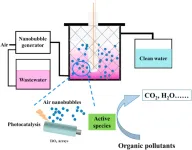(Press-News.org) Drugs approved in the US require “substantial evidence” that they are effective. But an investigation by The BMJ into the recent approval of the antibiotic Recarbrio from Merck suggests that these standards are being bypassed.
Peter Doshi, senior editor at The BMJ, describes how US Food and Drug Administration (FDA) scientists had serious doubts about Recarbrio - a product 40 times more expensive than an existing generic alternative - but the agency approved it anyway.
Did the FDA break its own rules in approving this antibiotic, and what does this case tell us about problems within the agency, he asks?
Recarbrio is a combination therapy made up of a new beta-lactamase inhibitor (relebactam) and a decades old Merck antibiotic (imipenem-cilastatin) to treat complicated infections. It costs between $4,000 and $15,000 for a course, compared with a couple of hundred dollars for the generic version of Merck’s old antibiotic.
In its FDA application, Merck submitted results from two clinical trials comparing Recarbrio with imipenem in adults with complicated urinary tract infections and in patients with complex intra-abdominal infections.
But FDA reviewers noted that Merck had studied the wrong patient population to evaluate the added benefits of the new drug, and said the trial for urinary tract infections showed that Recarbrio was as much as 21% worse in effectiveness than the older, less-expensive imipenem.
The FDA concluded that “these studies are not considered adequate and well-controlled.” And of a third clinical study, the FDA called it a “very small,” “difficult to interpret” “descriptive trial with no pre-specified plans for hypothesis testing.”
Yet despite all three clinical studies not providing substantial evidence of effectiveness, FDA approved Recarbrio.
“Instead of basing its decision on the clinical trials in Merck’s application, FDA’s determination of Recarbrio’s efficacy was justified on past evidence that imipenem was effective, plus - to justify the new relebactam component - in vitro (lab) studies and animal models of infection rather than evidence from human trials as required by law,” writes Doshi.
Others are concerned that Recarbrio’s approval essentially amounts to a return to a way of regulating medicines that the FDA abandoned a half century ago prior to the agency’s “substantial evidence” standard.
Doshi explains that, under specific circumstances, the Director of the Center for Drug Evaluation and Research (CDER) can waive in whole or in part the FDA’s “adequate and well-controlled studies” approval criteria. But the FDA told The BMJ ”there was no center director memo in the file” for Recarbrio.
And when The BMJ contacted Janet Woodcock, CDER Director at the time, and now the FDA’s Principal Deputy Commissioner, she said she was not aware that the clinical studies of Recarbrio did not provide substantial evidence of effectiveness.
Woodcock was also unable to confirm that approvals of new drugs require at least one clinical study of the drug itself that demonstrates substantial evidence - evidence lacking in the case of Recarbrio.
A spokesperson for CDER told The BMJ that FDA “applied regulatory flexibility” in approving Recarbrio.
It is unclear whether this regulatory flexibility enabled FDA to conclude Recarbrio had met the legal “substantial evidence” standard without “adequate and well-controlled investigations” of Recarbrio, says Doshi. FDA declined to answer the question, saying “We have no additional information to provide.”
The decline of science at the FDA has become unmanageable, argues David Ross, associate clinical professor of medicine at George Washington University, School of Medicine and Health Sciences, and former FDA medical reviewer, in a linked commentary.
He describes Recarbrio’s approval as “shocking” and says while much of the blame must go to the FDA’s reliance on industry paid user fees for around two-thirds of its annual drugs budget, “the corruption of the FDA’s scientific culture remains the primary culprit driving the deterioration of safety and effectiveness standards.”
To address this “dismal situation” he suggests tapering the FDA’s dependence on user fees and improving public access to the information received by the FDA, its reasoning, and its decisions.
“The Recarbrio approval is a sentinel event, warning of a return to an era when drug effectiveness was an afterthought,” argues Ross. “Although the FDA crowed about this approval, it would have been better advised to remember that “for a successful technology, reality must take precedence over public relations, for nature cannot be fooled,” he concludes.
END
Investigation raises questions over lack of “substantial evidence” for FDA approved antibiotic
Did new antibiotic meet the legal standard for approval? Are US drug regulatory rules being bypassed?
2023-05-16
ELSE PRESS RELEASES FROM THIS DATE:
Chemical exposure may raise your risk for Parkinson’s
2023-05-16
Two years of heavy exposure to TCE, a liquid chemical that lingers in the air, water and soil, may increase the risk of Parkinson’s disease by 70%.
Previous research has linked TCE, or trichloroethylene, to certain cancers, but a new study publishing in JAMA Neurology on May 15, 2023, is believed to be the first large-scale study to demonstrate its association with Parkinson’s.
TCE has been used for industrial and commercial purposes for nearly 100 years, and was used ...
How old are your bones?
2023-05-16
Researchers from The University of Technology Sydney (UTS) have measured the extent to which a bone fracture can lead to early death, and created a publicly available tool that doctors and patients can use to calculate risk.
The research, ‘Skeletal Age’ for mapping the impact of fracture on mortality has just been published in the prestigious scientific journal, eLife.
In the study of more than 1.6 million adults, the scientists found that a bone fracture was associated with a loss of one to ...
IU researchers find link between obesity and blood cancer
2023-05-16
Indiana University School of Medicine researchers studying clonal hematopoiesis of indeterminate potential (CHIP), a blood condition that may increase the risk of blood cancer, discovered that obesity was strongly associated with the condition. Their findings were recently published in the Journal of Clinical Investigation.
CHIP is a condition where blood cells accumulate genetic mutations, increasing the risk of developing blood cancer. Although CHIP is common in aging, the risk factors that contribute to the condition are poorly understood.
“Our study’s results showed being overweight ...
Degradation of Rhodamine B in the photocatalytic reactor containing TiO2 nanotube arrays coupled with nanobubbles
2023-05-16
The study is led by Xiaojun Han (School of Chemistry and Chemical Engineering, Harbin Institute of Technology).
With the rapid development of urbanization and industrialization, environmental problems became increasingly serious. Dye wastewater is considered to be one of the biggest challenges due to its high toxicity. Organic dyes have mutagenic, teratogenic, and carcinogenic properties, and threaten the health and life of humans while hindering plant photosynthesis, which brings risks to the ecosystem. Traditional organic pollutant treatment ...
Occasional cannabis use during pregnancy may be enough to impact fetal growth significantly
2023-05-16
As more people use cannabis for recreational purposes, attitudes towards the drug have changed. For example, research has shown that dispensaries often recommend cannabis – also referred to as marijuana – to pregnant women to ease pregnancy symptoms, especially morning sickness.
There is a growing body of literature attesting to poor child outcomes if cannabinoids are consumed during pregnancy. The exact effects on the developing fetus, however, remain unclear. Researchers in the US have now examined how timing of cannabis exposure during pregnancy impacts fetal development.
“We show that even when marijuana use occurred only ...
Severe hot flashes after menopause increase metabolic syndrome risk in women
2023-05-16
EMBARGOED UNTIL SUNDAY 14 MAY 2023 AT 00:01 CET
Severe hot flashes after menopause increase metabolic syndrome risk in women
Women who experience more severe hot flashes after menopause are more likely to develop metabolic syndrome and high blood pressure, according to research presented at the 25th European Congress of Endocrinology in Istanbul. The findings of this long-term study highlight the importance of using hormone replacement therapy for menopause in these women.
Metabolic syndrome is a group of three or more ...
Newly discovered RNA molecules hold promise for detecting and treating esophageal cancer
2023-05-15
CLEVELAND—Irregularities in the body’s genetic coding to make proteins are linked to cancerous tumors. But most genetic material contains elements whose function isn’t clear.
Could abnormalities in non-coding material also impact a person’s health, or even be linked to cancers as well?
A new study by researchers at the Case Western Reserve University School of Medicine suggests that the non-coding genetic molecules also play a key role in health and disease, including tumor development.
More specifically, ...
Henry Ford Health cardiologists look to the past to create new heart bypass procedure
2023-05-15
DETROIT (May 15, 2023) – Henry Ford Health Interventional cardiologists William O’Neill, M.D., and Khaldoon Alaswad, M.D., took a page out of the medical history books by performing a new coronary bypass procedure replicated from one not used in decades to treat a patient living with crippling angina ― a severe symptom of coronary artery disease.
Retired painting contractor Fred Casciano, 60, from Traverse City, became the first patient anywhere to receive the life-changing transcatheter procedure on April 12 at Henry Ford Hospital in Detroit. The procedure was re-engineered from an operation first developed in the 1950s.
“This new ...
Novel AI-based software enables quick and reliable imaging of proteins in cells
2023-05-15
The more, the better
“TomoTwin paves the way for automated identification and localization of proteins directly in their cellular environment, expanding the potential of cryo-ET,” says Gavin Rice, co-first author of the publication. Cryo-ET has the potential to decipher how biomolecules work within a cell and, by that, to unveil the basis of life and the origin of diseases.
In a cryo-ET experiment, scientists use a transmission electron microscope to obtain 3D images, called tomograms, of the cellular volume containing complex biomolecules. To gain a more detailed image of ...
Clinical trial of mRNA universal influenza vaccine candidate begins
2023-05-15
A clinical trial of an experimental universal influenza vaccine developed by researchers at the National Institute of Allergy and Infectious Diseases’ (NIAID) Vaccine Research Center (VRC), part of the National Institutes of Health, has begun enrolling volunteers at Duke University in Durham, North Carolina. This Phase 1 trial will test the experimental vaccine, known as H1ssF-3928 mRNA-LNP, for safety and its ability to induce an immune response.
The trial will enroll up to 50 healthy volunteers aged ...
LAST 30 PRESS RELEASES:
ASU researchers to lead AAAS panel on water insecurity in the United States
ASU professor Anne Stone to present at AAAS Conference in Phoenix on ancient origins of modern disease
Proposals for exploring viruses and skin as the next experimental quantum frontiers share US$30,000 science award
ASU researchers showcase scalable tech solutions for older adults living alone with cognitive decline at AAAS 2026
Scientists identify smooth regional trends in fruit fly survival strategies
Antipathy toward snakes? Your parents likely talked you into that at an early age
Sylvester Cancer Tip Sheet for Feb. 2026
Online exposure to medical misinformation concentrated among older adults
Telehealth improves access to genetic services for adult survivors of childhood cancers
Outdated mortality benchmarks risk missing early signs of famine and delay recognizing mass starvation
Newly discovered bacterium converts carbon dioxide into chemicals using electricity
Flipping and reversing mini-proteins could improve disease treatment
Scientists reveal major hidden source of atmospheric nitrogen pollution in fragile lake basin
Biochar emerges as a powerful tool for soil carbon neutrality and climate mitigation
Tiny cell messengers show big promise for safer protein and gene delivery
AMS releases statement regarding the decision to rescind EPA’s 2009 Endangerment Finding
Parents’ alcohol and drug use influences their children’s consumption, research shows
Modular assembly of chiral nitrogen-bridged rings achieved by palladium-catalyzed diastereoselective and enantioselective cascade cyclization reactions
Promoting civic engagement
AMS Science Preview: Hurricane slowdown, school snow days
Deforestation in the Amazon raises the surface temperature by 3 °C during the dry season
Model more accurately maps the impact of frost on corn crops
How did humans develop sharp vision? Lab-grown retinas show likely answer
Sour grapes? Taste, experience of sour foods depends on individual consumer
At AAAS, professor Krystal Tsosie argues the future of science must be Indigenous-led
From the lab to the living room: Decoding Parkinson’s patients movements in the real world
Research advances in porous materials, as highlighted in the 2025 Nobel Prize in Chemistry
Sally C. Morton, executive vice president of ASU Knowledge Enterprise, presents a bold and practical framework for moving research from discovery to real-world impact
Biochemical parameters in patients with diabetic nephropathy versus individuals with diabetes alone, non-diabetic nephropathy, and healthy controls
Muscular strength and mortality in women ages 63 to 99
[Press-News.org] Investigation raises questions over lack of “substantial evidence” for FDA approved antibioticDid new antibiotic meet the legal standard for approval? Are US drug regulatory rules being bypassed?




